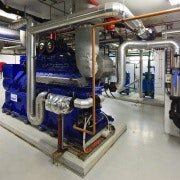Obama's climate vow
US President Barack Obama has made a point of listing climate change as a priority during his inauguration speech this morning.
Obama said a failure to act would be a betrayal of future generations in a somewhat surprising show of intent during a speech that was otherwise quite broad in its scope.
It follows hot on the heels of similar sentiments from Vice President Joe Biden, who told environmentalists on Sunday to “keep the faith”.
"I'll tell you what my green dream is: that we finally face up to climate change," Biden declared.
The Obama speech marked a significant progression from his 2010 inauguration speech, when the topic was barely mentioned in passing.
By way of comparison, three years ago his sole reference to climate change was:
“With old friends and former foes, we'll work tirelessly to lessen the nuclear threat, and roll back the spectre of a warming planet.”
In 2013, on the other hand, he dedicated a minute to the subject:
“We will respond to the threat of climate change, knowing that the failure to do so would betray our children and future generations. Some may still deny the overwhelming judgment of science, but none can avoid the devastating impact of raging fires, and crippling drought, and more powerful storms.
“The path towards sustainable energy sources will be long and sometimes difficult. But America cannot resist this transition; we must lead it. We cannot cede to other nations the technology that will power new jobs and new industries – we must claim its promise. That is how we will maintain our economic vitality and our national treasure – our forests and waterways; our croplands and snowcapped peaks.
“That is how we will preserve our planet, commanded to our care by God. That's what will lend meaning to the creed our fathers once declared.”
It is, for now, just words and even though Obama and Biden may want to act, there is a major roadblock: the Republican control of the House.
Obama knows all too well just how strong opposition from the other side of politics will be. Back in 2010 Republicans killed off a cap-and-trade scheme in Congress and from there progress stalled as the issue became more toxic and divisive.
In the 12 months leading up to the election climate change was pretty much completely taken off the agenda, at least until the arrival of Hurricane Sandy. But with the US mainland beset by drought, wildfires and that one unforgettable superstorm through what was their hottest year on record, the issue could not be ignored for long.
While it will be a challenge to make significant strides forward, Obama may be able to do so by sidestepping Congress altogether.
The following three-point plan that could evade the House seems feasible:
-- Use the Environmental Protection Agency to enforce stricter pollution standards under its existing authority through the Clean Air Act.
Last year the EPA made moves to restrict emissions from new power plants, but it could expand its reach to existing plants. According to the Natural Resources Defense Council, such a decision could slash emissions by 26 per cent by 2020, relative to 2005. This is likely to be the focal point of the second term Obama strategy.
-- Energy efficiency measures that will see improved standards for household appliances and buildings.
-- More support for renewables through targets, grant and/or tax credits. This would require a degree of Republican support, but that is not beyond the realms of possibility given the wind production tax credit just got extended and there are a number of Republican senators in states where solar and wind are having a sizeable impact. Clean energy legislation will, however, be more challenging to get through now than it was in 2010.
These would work in coalition with the drumming up of support for tackling the problem of dangerous climate change and the recent push to improve fuel efficiency standards.
With the guns debate at top of mind and the debt ceiling set to, excruciatingly, come back into the spotlight in coming weeks, expect to hear little more about climate change from the White House in the short-term. The next step will be February's State of the Union address when it will start becoming clear just how serious the President is to create a constructive climate policy legacy.













